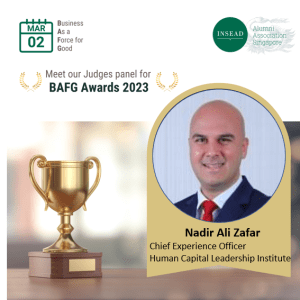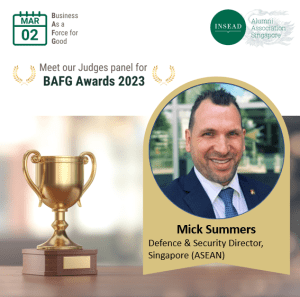Hearing from Brad Fraser MAP’18Apr
– Head of Prime Derivative Services Asia Pacific at Barclays

How did you determine which businesses demonstrated a strong commitment to being a force for good?
The criteria we used to differentiate particularly competitive and some really impactful companies was:
(1) the use of innovative solutions to a particular issue
(2) breadth of impact on a community
(3) but I think most importantly, the actual impact. How does the solutions impact the community?
For example, not just by providing internet access to a under-serviced community, but the impact access to the internet has on that community i.e. education, small business etc.
When evaluating how a company’s solutions impact a community, it’s important to consider both the intended and unintended consequences of their actions.
Intended impact refers to the direct and measurable results of a company’s solutions on a community. For example, if a company provides access to affordable healthcare to underserved communities, the intended impact would be improved health outcomes for those communities.
However, unintended consequences also need to be considered. These can include negative impacts that may arise from the implementation of a solution, such as environmental harm or unintended social consequences. For example, a company may introduce a new product that is meant to be environmentally friendly but it may end up using materials that are unsustainable, leading to negative environmental impacts.
To evaluate the impact of a company’s solutions on a community, it is important to take a holistic approach that considers both the intended and unintended consequences of their actions. This can be done through monitoring and evaluation of the impact of the solutions over time and engaging with the community to understand their needs and concerns.
Meeting our 2023 Judges – Interview series
Post #1 – Diana Gan – Founder of Elementary Capital
Post #2- Kaushik Burman – General Manager & Managing Director at Gogoro India Pvt Ltd)
Post #3 – Dr Vinika D. Rao – Executive Director, INSEAD Emerging Markets, Gender & Africa Initiatives; Asia Director, HGIBS
Post #4 – Mike Summers – Defence & Security Director, Singapore (ASEAN); Australia Trade and Investment Commission; Australian High Commission, Singapore
Post #5 – Nadir Zafar – Chief Experience Officer, Human Capital Leadership Institute
Post #6 – Tan Han Wee – Partner at Ernst & Young
Post #7 – David Mair – CEO at Republic Consulting & Secretary-General at INSEAD Alumni Association
Catch-up with 2022 Winners – Interview series
Post #1 – Michelle Woo, VP Venture Build, ENGIE Factory Asia Pacific (Corporate Winner)
Post #2 – Masami Soto, Founder of Buy One Give One – Empirics Asia
Post #3 – Gurpreet Singh, Chief Commercial Officer (CCO) at RightShip
Catch-up with 2022 Judges – Interview series
Post #1 – Li Lian Liew GEMBA’13 – Director, Corporate Planning at Tan Tock Seng Hospital & Central Health
Post #2 – Apo Ozkececi MCCC’19Dec-S – SVP Commercial & Regional Head, Asia Pacific, Accelya
Post #3 – Brad Fraser MAP’18Apr – Head of Prime Derivative Services Asia Pacific, Barclays
#iaasg





